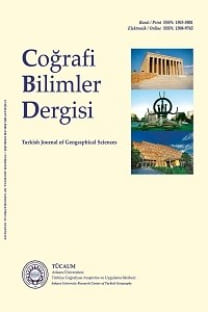Postmodern Eleştirilerin Coğrafi Düşünce ve Yeni Mekân Kavrayışları Üzerine Yansımaları
The reflections of postmodern critics on geographical thought and new spatial perception
Geographical thought, social theory, space postmodern geographies,
___
- Amin, A. and Thrift, N. (1992) “Neo-Marshallian nodes in global Networks”, International Journal of Urban and Regional Research 16(4): 571-587.
- Amin, A. and Thrift, N. (1994) Globalization, Institutions, and Regional Development in Europe, Oxford University Pres, Newyork.
- Arı, Y., (2005) “20. Yüzyılda Amerikan Coğrafyası: Genel bir değerlendirme”, 20.Yüzyılda Amerikan Coğrafyasının Gelişimi içinde, Arı, Y. (Editör), sayfa 3-19, Çizgi Kitabevi, Konya.
- Asheim, B.T., (1996) "Industrial districts as 'learning regions': A condition for prosperity", European Planning Studies, Volume 4(4), 379 – 400.
- Bryman, A., (2008) Social research methods, Oxford University Press.
- Bunge, W., (1962) Theoretical Geography, First Edition, Lund Studies in Geography Series C: General and Mathematical Geography, Lund, Sweden:Gleerup.
- Claudia, M., (2008) "Postmodern Geographies(1989):Edward Soja", İn Key Texts in Human Geography, (Ed.) Phıl Hubbard, Rob Kitchin and Gill Valentine, Sage Publication, 135-143.
- Crang, P., (1997) "Introduction:cultural turns and the (re)constitution of economic geography" In Geographies of Economies, (Ed.) J.Wills ve R. Lee, 3 -15, London:Arnold.
- Cresswell T., (2008) "Space and Place(1977):Yi-Fu Tuan", In Key Texts in Human Geography, (Ed) Phıl Hubbard, Rob Kitchin and Gill Valentine, Sage Publication, 53-60.
- Goodchild M.F., (2008) "Theoritecal Geography (1962) William Bunge", In Key Texts in Human Geography, (Ed.) Phıl Hubbard, Rob Kitchin ve Gill Valentine, Sage Publications, 5-18.
- Graham, S., (1998) "The end of geography or the explosion of place? Conceptualizing space, place and information technology", Progress in Human Geography, Vol. 22 (2), 165-185.
- Gregory D., (1994a) "Social Theory and Human Geography", In Human Geography:Society, Space and Social Science, Ed.: Derek Gregory, Ron Martin ve Graham Smith, Macmillan Press, London, 78-109.
- Gregory, D., (1994b) Geographical Imaginations, Blackwell Publishing, Oxford.
- Gregory D., Martin R. ve Smith G., (1994) Human Geography: Society, Space and Social Science, Macmillan Press, London
- Harvey, D., (1969) Explanation in Geography, Hodder Arnold Publication.
- Jupp, V., (2006) The SAGE Dictionary of social research methods, Sage Publications, London.
- Kaya, İ., (2005), “Sosyal Teori ve Beşeri Coğrafya”, Ulusal Coğrafya Kongresi 2005 (Prof.Dr.İsmail Yalçınlar anısına) Bildiriler Kitabı içinde, Editörler: Avcı, S. ve Turoğlu, H., sayfa 257-266, İstanbul.
- Khun, T., (1962) The Structure of Scientific Revolution, (Türkçesi: Bilimsel Devrimlerin Yapısı), Çeviren:Nilüfer Kuyaş, Alan Yayıncılık, 2003, İstanbul.
- Lefebvre, H., (1991) The Production of Space, Translated by D.N. Smith, Blackwell Publishers, London.
- Martin, R., (1994) "Economic Theory and Human Geography", In Human Geography: Society, Space and Social Science, (Ed.) Derek Gregory, Ron Martin ve Graham Smith, Macmillan Press, London, 21-53.
- Özgüç, N. ve Tümertekin, E., (2000) Coğrafya: Geçmiş, Kavramlar, Coğrafyacılar, Çantay Kitabevi, İstanbul
- Peet, R., (1998) Modern Geographical Thought, Blackwell Publishing, Oxford
- Philo C. and Söderström O., (2004) "Social geography: looking for society in its spaces", In Human Geography: A history for the 21st Century, (Ed.)George Benko and Ulf Strohmayer, Oxford University Press, New York, 105-138.
- Schaefer, F., (1953) “Exceptionalism in Geography: A methodological Examination”, Annals of the Association of American Geographers, 43: 226-249.
- Schoolman M. and Campbell D., (2008) "Introduction:Pluralism 'Old' and 'New'" In The New Pluralism: William Connolly and the Contempporary Global Condition, Duke University Press. London.
- Scott, A.J., (2000) “Economic geography: the great half-century”, Cambridge Journal of Economics, 24, 483-504.
- Scott, A.J., (2006) "A perspective of economic geography", In Economic Geography: Past, present and future, (Ed.) S. Bagchi-Sen ve H.L. Smith, Routledge Studies in Economic Geography, 56-79.
- Sibley, D. (1995) Geographies of Exclusion: Society and Difference in the West London Routledge.
- Soja, E.W., (1989) Postmodern Geographies: The Reassertion of Space in Critical Social Theory, London: Verso Press.
- Tekeli, İ., (1979) Mekân Organizasyonlarına Macro Yaklaşım İçin Bir Deneme, ODTÜ Mimarlık Fakültesi, Ankara
- Trochim, W.M., (2006) The Research Methods Knowledge Base, 2nd Edition., (URL: http://www.socialresearchmethods.net/kb/, 20.11.2008).
- Tümertekin, E. ve Özgüç, N., (1998) Beşeri Coğrafya, Çantay Kitabevi, İstanbul.
- Yavan, N., (2005) “Bilim Felsefesi Bakımından Coğrafyada Pozitivist Yaklaşım”, Ulusal Coğrafya Kongresi 2005 (Prof.Dr.İsmail Yalçınlar anısına) Bildiriler Kitabı içinde, Editörler: Avcı, S. ve Turoğlu, H., sayfa 405-414, İstanbul.
- ISSN: 1303-5851
- Yayın Aralığı: 2
- Başlangıç: 2003
- Yayıncı: Ankara Üniversitesi Türkiye Coğrafyası Araştırma ve Uygulama Merkezi
Türkiye’de Evlilik Göçünün Mekânsal Veri Analizi Teknikleriyle Değerlendirilmesi
Postmodern Eleştirilerin Coğrafi Düşünce ve Yeni Mekân Kavrayışları Üzerine Yansımaları
Doğal Tehlikelerin Değerlendirilmesine Bir Örnek: Taşova
Küresel Bir Süreç Olarak Demografik Dönüşüm: Mekânsal Bir Değerlendirme
Kaz Dağı’nda Yüzeye Gelen Güneş Enerjisinin Dağılışında Topografyanın Etkisi
Bir Sulak Alan Nasıl Yönetilmez? Kültürel Ekolojik Perspektif ile Marmara Gölü (Manisa) Örneği
